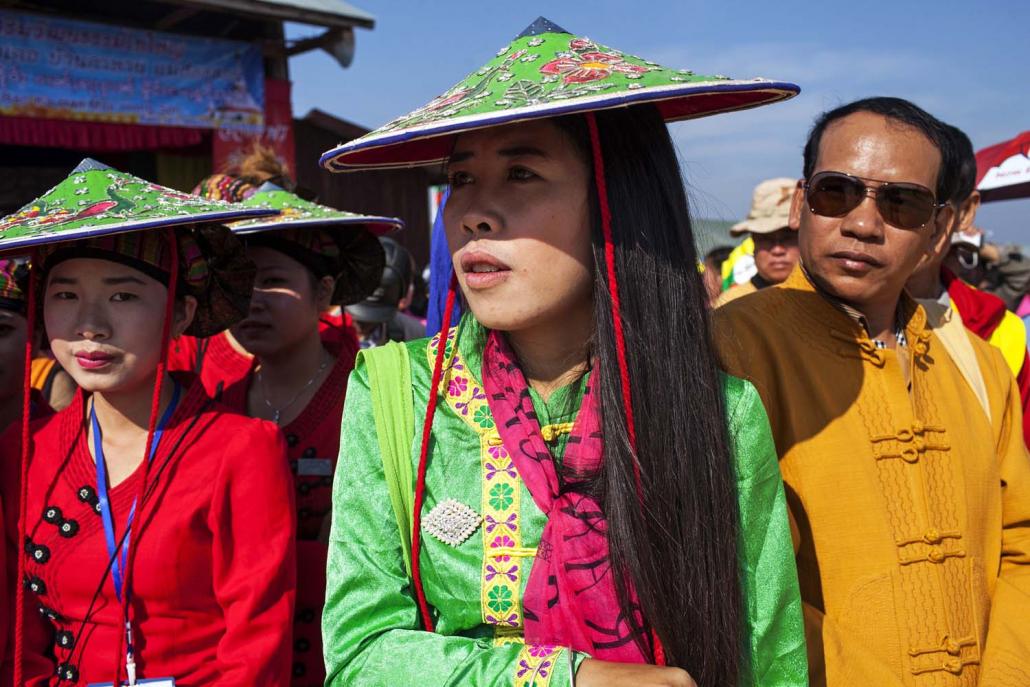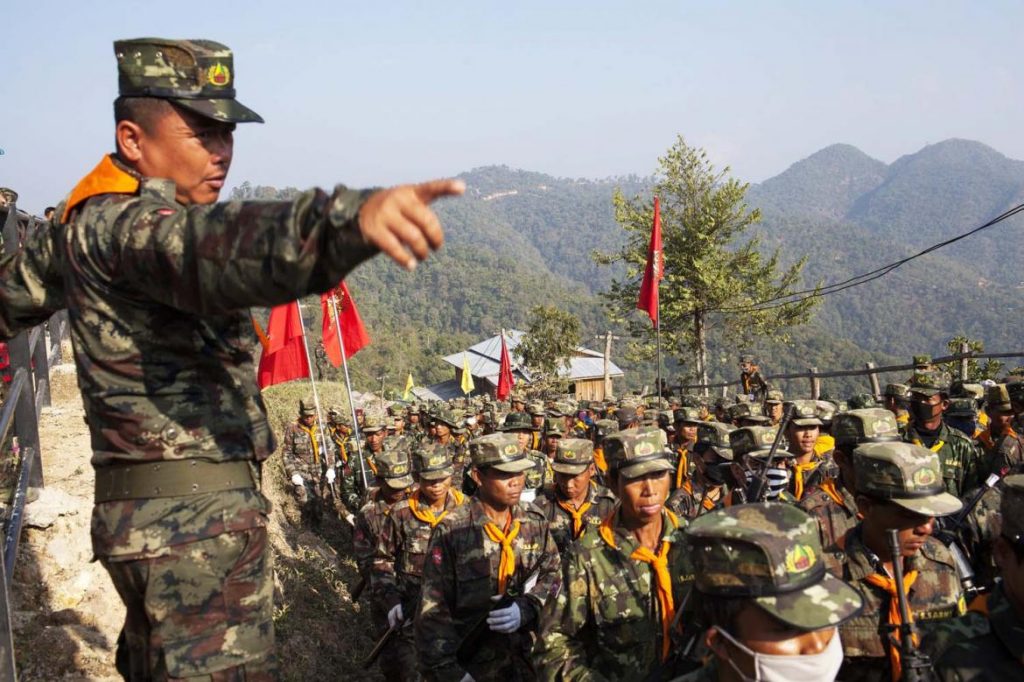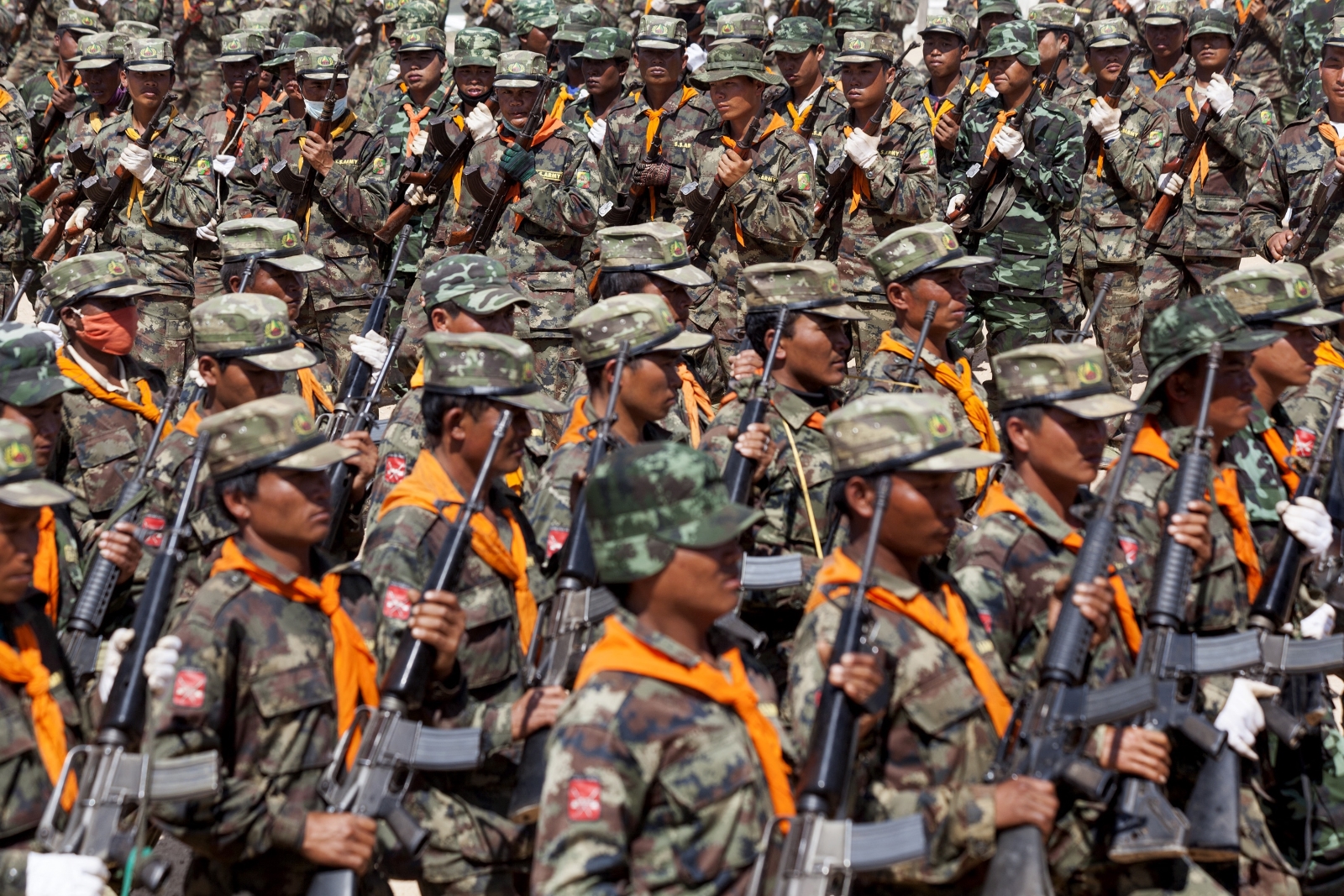Shan armed groups are accused of obstructing family planning programmes so as to ensure more recruits for their armies, at the expense of women’s health.
By MAGGI QUADRINI | FRONTIER
IN AUGUST last year, the Shan Women’s Action Network provided supplies for a contraceptive implant training in a village of Kunhing Township in southern Shan State. Following this, the Restoration Council of Shan State, the ethnic armed organisation that controls the area through its armed wing, the Shan State Army-South, sent a letter to SWAN health workers that forbade them from providing birth control implant services and supplies in Kunhing.
A similar ban was imposed by the Shan State Progress Party, another Shan group whose armed wing is the Shan State Army-North, in remote areas of neighbouring Kyethi Township.
SWAN is a network of Shan activists and community workers based in Shan State and northern Thailand that was established in 1999. The group has been conducting reproductive health training courses and related activities, including household surveys on existing family planning methods and needs, for the past seven years in Shan.
However, ethnic armed organisations such as the RCSS and SSPP are reluctant to allow certain contraceptive programmes in areas under their control because they believe these programmes will make it harder for them to expand their armies with fresh recruits. For them, family planning eventually means fewer men under arms.
Support more independent journalism like this. Sign up to be a Frontier member.
Nang Kham Nyo Htwe is one of the SWAN health workers that were warned by the RCSS against providing implant supplies.
“The armies are worried about population growth and they don’t understand that the implant is not permanent,” Kham Nyo Htwe told Frontier. “If they would listen to us explain, they might allow the training to take place, but it is not their priority. They want to grow their armies.”
A former coordinator of SWAN’s women’s well-being programme, who asked not to be named, said it was common for Shan armed groups to oppose family planning because they want to increase the ethnic Shan population.
“We know the needs of our community but security forces do not understand,” she said. Nonetheless, she added, “This doesn’t stop our work from being done. If we can’t come into the village, we meet the women in the town after doing the trainings in Chiang Mai.”
Lieutenant-Colonel Sai Yawd Muang, who heads the RCSS’s foreign affairs department, told Frontier the RCSS rejects the claim that it is opposed to family planning; he said that birth control services are available at the RCSS headquarters of Loi Tai Leng, near the border with Thailand.
However, he said that all issues needed to be considered and discussed, and the security situation assessed, before any type of training or workshop could take place. He added that RCSS army recruits learn about family planning during their training, but that combat training takes priority. But he was unable to say whether soldiers, male or female, were taught about women’s sexual and reproductive health.
Yawd Muang said the importance that the RCSS places on education, including for women, is evident in the operations of a new training centre in Loi Tai Leng. He said the centre has facilities for women who are pregnant or need counselling after losing a loved one in conflict, and also provides women with professional training, including tailoring and First Aid classes. However, he said that women recruits were not allowed to fight on the front lines and instead work as teachers and nurses, and perform other social welfare tasks.
Yawd Muang said that, though many young women want to join the RCSS to protect the Shan people and promote their interests, “It’s not a woman’s job to fight. Women are capable and can do many things without being on the front lines.”
Army recruits and MPs
Shan State has the highest number of ethnic armed organisations in Myanmar. Some, like the Palaung State Liberation Front, whose armed wing is the Ta’ang National Liberation Army, are in open conflict with the Myanmar army, known as the Tatmadaw; others, like the RCSS, keep fragile ceasefires with the Tatmadaw; and scores of small militias operate under the ostensible command of the Tatmadaw, which itself keeps bases and mobilises across Shan.
The need for young men to fill the ranks of these armed groups, amid continued conflict, has contributed to rampant forced recruitment in some places. In July last year, Radio Free Asia reported that the RCSS had forcibly recruited more than 50 young men from villages in Mongpan Township.
The lack of female decision-making power in most ethnic armed group organisations is a likely factor in women’s health issues being downplayed in favour of military strategy. A policy brief published in January by the Peace Research Institute Oslo concluded based on a survey that “women play subordinate roles in all armed organizations in Myanmar”.
They account for 4 percent of seats on the central executive committee of the PSLF, 9 pc of seats on the CEC of the Karen National Union, and 0 pc of seats on that of the RCSS. This severe under-representation also minimises the input of women in the current peace process, given the dominance of armed actors in negotiations.
Meanwhile, electoral politics under the Tatmadaw-drafted 2008 Constitution, with periodic elections for the Union parliament as well as state and regional assemblies, is stoking more general concern over relative population growth among ethnic groups.
Ethnic-based political parties, including several that seek to represent the Shan, hope to increase their share of seats in the 2020 general election, but the success of each of these parties will be limited by the number of their ethnic constituents. A smaller proportion of Shan in the state’s population may result in lower Shan representation in parliament. Parties representing the smaller Ta’ang and Pa-O communities managed to win a significant number of seats in the 2015 election, and may win more in 2020.
“Elections depend on population,” Nang Hawm Hseng Khurh, a nursing student in the Shan State capital, Taunggyi, told Frontier. “Ta’ang and Pa-O people are minority ethnic groups, but with bigger populations, they will have more autonomy.”
Hawm Hseng Khurh said fear of losing out to other ethnic communities, both in terms of armed clout and political representation, had fed opposition to birth control among Shan leaders. “Some believe family planning limits generational growth and this puts pressure on the women,” she said.
“Elders and especially the armies want to preserve the ethnic lineage,” she said, while arguing that, without family planning and its benefits in terms of reduced maternal and early childhood death, none of these objectives were in fact possible.

Shan in traditional dress attend the Shan National Day celebrations at the headquarters of the Restoration Council of Shan State in Loi Tai Leng on February 7, 2015. (AFP)
A critical gap
Hawm Hseng Khurh says all fourteen of her female classmates in Taunggyi have directly observed how a lack of knowledge about reproductive health can hurt communities in areas under the control of ethnic armed organisations.
Women in rural areas of Shan often lack basic knowledge about sexual and reproductive health. Many don’t have access to health workers, or a traditional midwife, meaning that expecting mothers, many of whom are aged between 16 and 18, miss out on advice about managing their pregnancies.
Across Myanmar, pressure is heaped on women to have multiple children, and pregnancies are frequently unplanned. This harms the health of the mother and the baby and contributes to a high maternal death rate, which, at 282 per 100,000 live births according to the 2014 Myanmar census, is the second highest in ASEAN.
Combined with a lack of health providers and services in their communities, women in many rural areas are denied autonomy over their bodies, and from making choices in the interest of their own health rather than the perceived interest of the wider community (as determined mostly by men).
Contraceptive use by women of reproductive age in Myanmar overall is 55.2 pc, and 16 pc have no access to family planning services, according to the census. In neighbouring Thailand, by comparison, contraception has been used by more than two thirds of women aged 15–49 years for the last 30 years, and only 3 percent lack access to family planning services.
Myanmar is the only developing country in Southeast Asia where the military’s share of the national budget is higher than combined government spending on healthcare and education. However, even the sparse government health surfaces that exist often do not reach communities affected by conflict, such as in Shan.
The contraceptive implant provided by SWAN has proven to be popular with women where it is has been made available. Most say they want the implants because they do not want to have more children, given the toll that pregnancy and childbirth has taken on their bodies, while others express a desire for lengthier spaces between births or wish to avoid pregnancy altogether because of a pre-existing health condition.
Recipients are asked to pay K10,000, but the implants are provided for free to women who cannot afford that sum. It takes 15 minutes to insert the implants, which are effective for up to five years, and most women are medically eligible for them. The implants can also be removed at any time by a trained health worker.
A basic health right
A public health specialist who has worked with different ethnic communities in Southeast Asia for the last 40 years, and who requested anonymity, says the opposition of ethnic armed organisations in Myanmar towards family planning stems from a basic lack of understanding about women’s reproductive health.
“Usually, health is talked about with a lens of curative care or emergency treatment; they want knowledge on how to take care of injured soldiers,” he told Frontier.
While acknowledging the concerns of ethnic armed organisations over the impact of family planning on population growth, he says the focus should be on empowering men and women to decide how many children they want over a period of time, in a way that takes into account economic and health concerns.
“[Armed group] leaders say they want a lot of people in their communities because they want a lot of soldiers,” he said. “But are they asking families if they want a lot of children?”
He adds that he has grown accustomed to resistance to family planning from the leaders of ethnic armed organisations. “The reality is, in countries where militaries are involved, there is a demand for soldiers,” he said, arguing that this resistance is counter-productive: “Without family planning, maternal death and early childhood death is very high. A large percentage of young children die and will never become soldiers.”
He says groups providing family planning services need to plan and operate carefully to avoid misunderstandings. Armed groups do not necessarily oppose outright the use of birth control pills or injections, he says, and there are reasonable concerns about the risk of contraceptive products available in villages having expired or being imports with instructions in languages that community members cannot understand.
However, though SWAN has tried to arrange meetings with the Shan armed groups to discuss the benefits of family planning, its efforts have so far been ignored.
“We’ve sent letters but they are not open to these kinds of talks. If they change their mind, we would have more access. It’s a basic health right for women to decide what is best for their bodies,” said the former SWAN coordinator.
TOP PHOTO: Soldiers of the Restoration Council of Shan State march through the group’s headquarters of Loi Tai Leng in February 2015. (AFP)
Correction: Lieutenant-Colonel Sai Yawd Muang’s position has been clarified as the head of the RCSS’s foreign affairs department. He was previously designated as an RCSS spokesperson.







